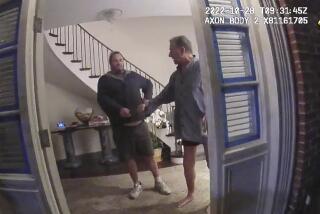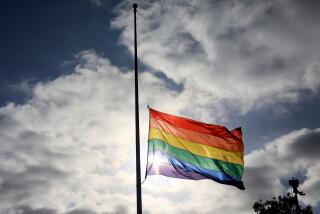Media Should Have ‘Outed’ Foley
THE FINGER-POINTING in the Mark Foley scandal has curiously not focused on one particularly powerful player complicit in allowing the Florida Republican to continue his detrimental behavior for years: the American media.
By not reporting on Foley’s deceitful life for more than 15 years — during which he portrayed himself as a heterosexual politician — the media enabled a man overwhelmed by the destructiveness of the closet to ultimately implode in the halls of Congress. By looking the other way on something that made them uncomfortable — reporting on closeted gay public figures, particularly those who are hypocrites — and by deluding themselves that it’s a privacy issue, reporters, producers and editors took part in perpetuating a fiction, one that may well have led to an ugly outcome.
Well-intentioned people, including gay activists and gay journalists like myself, rightly want to separate Foley’s homosexuality from his predatory behavior. Yet in the zeal to make this point, a fundamental issue has been overlooked. Although homosexuality, like heterosexuality, is not inherently dangerous, repressed sexuality — whether it’s repressed homosexuality or repressed heterosexuality — certainly can be harmful when the dam bursts.
Foley lived in a glass closet in Washington, where many people, we’re now being told, assumed he was gay, even as he orchestrated a lie for the voters of his district with help from the media both in Washington and at home in Florida.
Foley’s closet wasn’t just about protecting his political career. He seemed to be filled with shame. According to one gay man quoted in the Washington Post last week who challenged Foley on his voting for the Defense of Marriage Act in 1996, Foley justified marginalizing gay marriage by saying, “I could never compare any relationship I have ever had to the nature of my mother and father’s relationship.”
For Foley, homosexuality meant second-class status.
That kind of self-loathing is bound to play out in harmful ways. Would Foley have made online sexual advances on teenagers if he were openly gay or if he’d been reported on, truthfully, by the media as a gay man long ago, and faced the consequences? It’s quite possible the answer is no.
Like Foley, many of the abusive priests who came to light in the Catholic Church sex abuse scandal were not pedophiles — in that they were not preying on prepubescent children. They were abusing teenage boys just shy of the age of consent. It’s obvious from their stories that at least some of these men joined the priesthood to suppress their gay sexuality but eventually began to exploit the most vulnerable among people to whom they regularly had access and over whom they had influence.
That scenario is similar to the case of then-closeted Massachusetts Democratic Rep. Gerry Studds in 1982, when it was revealed that he’d had consensual sex with a 17-year-old male page during a summer recess nearly 10 years earlier. Studds is today married (in Massachusetts) to a 48-year-old man with whom he has been coupled since 1991, proof of the stability of being out versus the chaos of the closet. (Studds has also said that being brought out of the closet in the scandal was the “best thing” to happen to him.)
Since the beginning of the debate over “outing” — a term coined by Time magazine amid media outrage over my outing of Malcolm Forbes after he died in 1991 — the media has moved a bit in a positive direction on the issue. But, mostly, reporters still run away from it.
The standard should be simple: If a public figure’s homosexuality is relevant to a larger story, then the public should know. Foley voted for an anti-gay law, which should have been reason enough for the press corps to expose his hypocrisy. When aspects of a public figure’s heterosexuality are relevant — past relationships, marriages, children, divorces and the like — the media dutifully report on them, whether or not the subjects approve of such reporting.
Some of these issues point to a politician’s character and basic truthfulness, or simply show us how stable a human being the individual may or may not be. Shouldn’t we also know if a politician is living a debilitating lie that could bring him or her down?
If homosexuality is to be treated as truly equal to heterosexuality, journalists will have to stop viewing the reporting of a public figure’s orientation as “revolting,” to quote Foley himself when rumors were raised in 2003. Had the mainstream media followed through on Foley, we might not be experiencing a media and political meltdown now.
More to Read
Start your day right
Sign up for Essential California for news, features and recommendations from the L.A. Times and beyond in your inbox six days a week.
You may occasionally receive promotional content from the Los Angeles Times.






